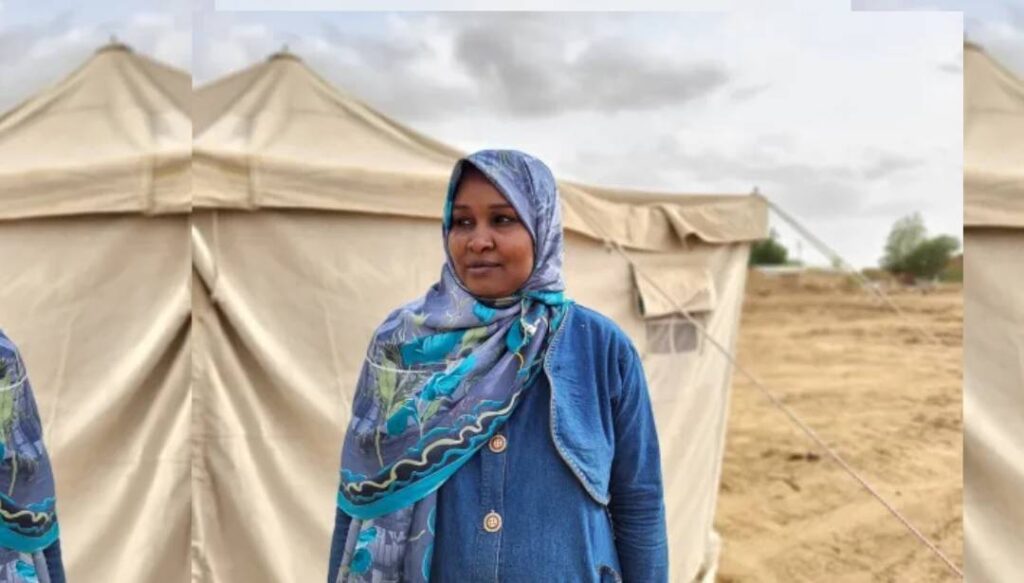‘I definitely cannot meet all of my guests’ needs.’
Aid worker for Mercy Corps in Kassala, Sudan
When I was growing up, my father had a building in our house that was just for guests. It taught me something valuable: that it is very normal for Sudanese people to host, feed, and support others; that solidarity is a central part of our cultural heritage.
Many years later, my country is at war and I am now a host. From a humble house in the eastern town of Kassala, I am supporting 12 displaced people, all of them family members uprooted by the fighting that has spread through my country.
I am not alone in doing this. Roughly half of the nearly eight million Sudanese internally displaced by the conflict are being accommodated by friends, family, or strangers. We are the frontline responders to the world’s largest displacement crisis.
I am happy to be a host and have my relatives close to me, though I must admit that it is not an easy job. Hosting is having a big impact on my life because all of my salary now goes to providing everyone around me with food and other basic needs.
I also do not have privacy anymore in my own house, nor much time to myself to think and reflect. In Sudan, when you host people, you are expected to spend time and chat with them. Otherwise, it shows disrespect.
Although we are currently safe in Kassala, we are also having to plan what we would do if the security situation deteriorates, as it has in other nearby states. It is possible that today’s host families will become tomorrow’s guests.
I hope that sharing my story will help raise awareness about the role that hosts are playing in the humanitarian response here, because right now neither hosts nor our guests are receiving much support from humanitarian agencies.
With their limited resources, aid groups are instead mostly focusing on the displaced people living in public shelters and other official sites, though even they receive little support and speak of hunger, a lack of water, and inadequate shelter.
I also hope that sharing my story will help people understand the suffering that Sudanese people are experiencing. Before, we were productive and self-sufficient with jobs and businesses. Now, we are forced to depend on the support of others.
From Darfur to Kassala
Though I am hosting displaced people, I have also been uprooted by this conflict, which started in April 2023 and pits the Sudanese army against the Rapid Support Forces, a paramilitary group.
The war has produced the world’s biggest hunger crisis as well as the largest displacement crisis – forcing more than 10 million people from their homes, including two million who have escaped to neighbouring countries.
Before the conflict, I was living in my hometown of Nyala, the capital of South Darfur state (one of five states that make up the western Darfur region) with my husband and five children. I worked at the Nyala office of Mercy Corps, the American NGO.
The situation became untenable, however, because our residential area was trapped on the front line. We would see heavy weapons from our windows and hear constant shooting.
All we could do was hide inside the house and under our beds. One day, explosive debris killed my neighbour’s daughter and blew a hole in our living room door while we were sitting in the space.
In November, we made the decision to leave Darfur for Kassala. We could not get a bus, so we did most of the journey on the back of a truck, stacked on top of piles of animal feed, wood, and luggage.
There were maybe 100 others in the truck, which took 10 days to reach Kassala. The journey was crowded and uncomfortable, and the road was tough, especially during a four-day desert crossing. Most of my family got sick along the way.
Since I have settled in Kassala, more relatives displaced from Darfur have been arriving here to stay with me. We currently have 19 people in my house, including my immediate family.
Among the guests are my husband’s mother, who is over 90, diabetic, and suffering from high blood pressure, and my husband’s sister, who we think might have cancer. We weren’t able to test her until recently due to the lack of health services.
Both of them came from Darfur, and it took them 19 days to reach Kassala. Can you imagine having such disabilities and having to uproot your life and take a journey of this kind?
The challenges of hosting
In order to host everyone, we had to build an extra room outside our house and buy furniture and appliances. My husband’s colleague lent us four beds and kitchen utensils for a month when we arrived, and we are trying to secure more when we next get our salaries.
We share the space as best we can, but the house is cramped. We have only two toilets and seven people are currently sleeping in my bedroom – three of them on beds and four on plastic mats.
We have to pay for almost everything – water, food, and medical treatment – even as market prices are increasing every day.
Some of our guests are trying to help. My sister’s husband who is in El Fasher (the capital of North Darfur state) occasionally sends money, which they use for school fees and other personal needs. Yet while our guests are eager to work, they have faced challenges finding employment.
We have to pay for almost everything – water, food, and medical treatment – even as market prices are increasing every day. We are struggling to buy vegetables, and even bread is now more than double what it was three months ago.
I definitely cannot meet all of my guests’ needs. Some are sleeping on mats and on a veranda, and more care and attention is required for the elderly and for my sick sister-in-law who is vomiting everything that she eats.
I am not able to give my children as much food as before because we need to share everything. I also have to add water to milk just so all the children I am hosting can get some. Five children are, meanwhile, in school – and that has costs too.
The expenses are digging into my savings. For years, I put aside money to buy a car and complete the construction of our Nyala home – which armed men have been using and looting since we left – but I spent it all to get furniture and appliances in Kassala.
Mercy Corps
Yosra Hamid Mohammed Adam at her office in Kassala, where she works for the NGO Mercy Corps.
The only money I have set aside is in case the war expands to Kassala and we have to leave the city for somewhere else – something that has happened to displaced people and host families in many areas.
I am trying to manage all of these challenges while working a full-time job with Mercy Corps, now as the team leader of their Kassala office. I don’t know if I am doing it well, but I know that I am trying.
I also remind myself that while it is crowded in my house, others face worse conditions. Some neighbours are hosting over 20 people, and other displaced are in public buildings like schools, where there can be 10 families in a single classroom.
What we experienced in Nyala
While acting as a host I have also had my own things to process, not least the memory of what happened while we were still living in Darfur. You cannot imagine how hard it has been living through this conflict. It has taken so much from us.
In Nyala, we saw people dying on the streets with nobody to take away the bodies or even cover them up. One of my brothers, who is called Omay, got hit by a stray bullet in his back, and my brothers had shops that got looted and damaged.
I did my best to help others during these difficult days. Neighbours would come to take refuge in our house due to our concrete roof, and would stay there until they felt safe. I would feed them and provide them with what they needed.
Yet, by September, things were worsening. Three times within two days, armed men tried to enter our house and use it as a hiding spot because of our solid roof. It terrified my children and others living with me.
On one occasion, the armed man knocked on our doors and, when I didn’t open, they jumped over the compound wall. A second time, they started breaking our locks, so I went over to them and said many families with children were living inside the house.
From that moment, I decided to leave Nyala with my extended family and travel to El Fasher. We left on a Friday but fighting erupted in El Fasher on the Saturday, and things soon became even worse for us.
My youngest sibling, Maaz, was kidnapped for three days from our residence in El Fasher while the rest of us were out. Then, a month later, my uncle and another brother, Mawia, were taken from my uncle’s house by men who also tried to loot their vehicle.
Why work is keeping me going
Right now, I am thinking deeply about how to support my brothers who were kidnapped. I want to find a safe place for them so they can have a better life and manage their trauma.
I am also trying to figure out how I can process my own trauma. However, for now, I have found that if I sit in my house and start reflecting on recent events too much, then things become difficult for me.
People also frequently ask us why Sudanese people are not getting support like other crises around the world do. I honestly don’t know what to tell them.
In many ways, work is keeping me going. It helps me support my family and it gives me something to focus my energies on. Even when I feel sick, I still go to the office because this job is so important to me.
Still, while I love humanitarian work, it can be difficult to see people who are hungry and sick and not be able to help them. Sometimes, the people we support through our work don’t realise that we aid workers have also been affected by this conflict.
People also frequently ask us why Sudanese people are not getting support like other crises around the world do. I honestly don’t know what to tell them.
I would like to start thinking about the future but it is clear that we cannot do that until we find a solution to end this conflict. All we can think about now is finding a safe place to meet our most basic needs, and the needs of those who we are supporting.
This article was first published by the New Humanitarian:

